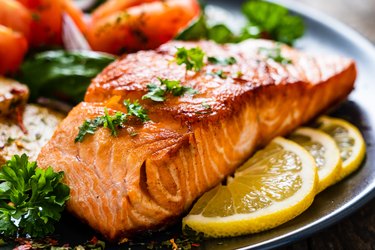
Just like you can't spot-reduce and choose where on your body to lose fat, you can't choose where you'll gain it, either. And those trying to gain some weight run the risk of adding belly fat — the dangerous kind — by not getting the proper nutrition and exercise.
Achieving a healthy weight and body composition requires strategically adding calories, eating the right foods and working out properly. Here, you can find out exactly how to gain weight without adding belly fat.
Video of the Day
Video of the Day
1. Take in More Calories
The first step to gaining weight is creating a calorie surplus. That is, you need to consume more than you burn.
The Cleveland Clinic suggests you aim to take in around 300 to 500 extra calories daily to gain at a slow-and-steady (read: healthy) pace of about 1 pound per week.
Of course, you'll first need to determine how many calories you need to maintain your current weight, which varies based on your age, sex and activity levels. In general, the 2020-2025 Dietary Guidelines for Americans recommends people assigned female at birth (AFAB) eat somewhere between 1,600 and 2,000 calories and people assigned male at birth (AMAB) eat 2,000 to 2,400 calories per day to maintain weight.
For a more personalized number, you can try tracking your daily calories and weight for several weeks using a food diary, or you can use an online calculator or calorie-counting app to determine your daily calories.
Then use this formula to gain weight:
Maintenance calories + 500 = Daily calorie goal
2. Limit Processed and Fast Foods
Sure, everyone deserves a treat here and there, but eating chips, doughnuts and fried stuff 24/7 is a recipe for stomach fat.
Constantly eating processed and fast foods with weight gain in mind will deprive your body of necessary nutrients, according to the American Academy of Family Physicians. And even if you do add some pounds to your frame this way, you're not doing your body any favors.
Eating these types of foods can make you gain belly fat. This is the harmful kind — the hard, visceral fat that's stored deep within your stomach and linked to health issues like type 2 diabetes, heart disease and cancer, according to Harvard Health Publishing.
So, limit refined carbs like white breads, white rice and pasta; sugar (desserts, candy, soda); and saturated and trans fat (chips, fried food, packaged snacks).
Related Reading
3. Eat More Frequently
People with underweight may have a poor appetite or get fuller faster, so the whole three-meals-a day thing may not work. Eating smaller meals every three to five hours, plus a couple of snacks in between, may help someone take in more calories without getting too full, according to the Cleveland Clinic.
But do what works for you. Isabel Smith, RD, founder of Isabel Smith Nutrition and Lifestyle, says that a more traditional eating plan — like three meals and a few snacks a day — is perfectly fine, as long as you're getting in those extra calories from nutrient-dense foods. "Snacks can really make a difference for people as they're trying to gain weight — it can really be a game-changer!" she says.
4. Up Your Protein
Make sure you're getting enough protein in your diet. A small January 2012 study in Nutrition and Metabolism had 27 participants self-report their moderate workouts and protein intake for three days. The study's data shows that both quality as well as distribution of dietary protein throughout the day is associated with regulating belly fat.
And according to Harvard Health Publishing, higher protein consumption may be linked to strength preservation and lean muscle mass (muscle weighs more than fat, so that's good news for healthy weight gain). "For the average person, around 30 grams of protein per meal is a good place to start, and 10 to 15 grams maybe for snacks," Smith says.
Lean protein such as chicken, turkey and fish are great choices, as well as cottage cheese, Greek yogurt, beans, whole milk and eggs.
5. Choose the Right Carbs
Carbs are an essential part of any diet — even when you're trying to gain weight. They provide you with glucose, which fuels your body to keep it functioning normally and gives you the energy for physical activity, per the Harvard T.H. Chan School of Public Health. What a lot of people don't realize when it comes to a healthy diet for weight gain: It's about quality over quantity.
The best carbs are those that deliver vitamins, minerals, fiber and phytonutrients. "Increase (carb) portions everywhere," Smith says. "Eat root veggies, whole grains, beans and legumes. Grains are a pretty significant source of calories, so increasing portions can help overall."
Examples of healthy whole grains include oatmeal, brown rice, bulgur and whole-wheat bread and pasta.
As stated above, limit carbs that are low in nutrition. Anything with added sugar, foods with refined grains, sugary drinks, candy and packaged baked goods will definitely help pack on the pounds, but they're more likely to add belly fat.
6. Make Friends With Fats
So, now that you know protein can help build lean muscle and carbs give you energy, are you wondering about fats? Newsflash: Fats are your friends! They promote lean muscle growth (if you work out), promote good cholesterol, store vitamins and are calorie-dense, according to the International Sports Sciences Association (ISSN).
The catch is that your diet should consist mainly of monounsaturated and polyunsaturated fats in order to reap the benefits. Eggs, salmon, nuts and seeds, natural nut butters and avocado are excellent sources of fat — and they make really good snacks, too. And use canola or olive oil for cooking instead of butter, or use them in salad dressings.
"Fats are so good for you, so glycemically balanced and great for helping to boost calorie intake — nuts, seeds, avocado, olives, olive oil and oils in general," Smith says.
Related Reading
7. Change Up Your Veggies
Yes, all vegetables have their benefits, and you should absolutely incorporate them into your daily diet. But some are better for weight gain.
A large September 2015 study in PLOS Medicine examined the correlation between change in intake of specific fruits and vegetables and change in weight in three groups of people (more than 130,000 total), from 1986 to 2010. The researchers found that increased consumption of starchy vegetables like corn, peas and potatoes was linked to weight gain. High-fiber, lower-glycemic vegetables (like broccoli and Brussels sprouts) were inversely associated with weight change.
The takeaway is to prioritize starchy vegetables, which include potatoes, corn, peas, acorn and butternut squash, pumpkin and plantains, per The John Hopkins Patient Guide to Diabetes.
8. Lift Heavy
Even those looking to gain weight should incorporate exercise into their plan — not so much to burn calories, but to use the extra calories you're taking in to put on muscle. And that's why you should prioritize strength training — namely weightlifting.
An July of 2012 article in Current Sports Medicine Reports states that 10 weeks of strength training can increase lean muscle by 1.4 kilograms (around 3 pounds). That's a decent amount of muscle right there. And remember — the more muscle you have, the less room there is for fat.
If you're trying to bulk up a bit, lift heavier weight for a lower number of repetitions, according to the National Academy of Sports Medicine. You need to "overload" — that is, work your muscles more than they're used to, and then slowly increase weight and reps as you get stronger. So: heavier weights, shorter reps and more sets of a each exercise.
P.S.: You should still include some light cardio in your routine to keep your heart and respiratory system healthy. Just don't overdo it because you're not looking to burn a ton of calories.
9. Be Consistent
Healthy, steady weight gain requires planning and diligence. Remember, this is a lifestyle change. Carry high-calorie, nutritious snacks with you, don't skip meals, don't be afraid to have full-fat anything (like milk), don't fill up on water before a meal and don't expect huge gains overnight.
But please — do enjoy some treats here and there, rest when you need to and try not to stress. If you need extra support, make an appointment with a medical professional, dietitian or personal trainer.
- Cleveland Clinic: "High-Calorie Foods and Snack Ideas to Gain Weight"
- American Academy of Family Physicians: "Healthy Ways to Gain Weight If You’re Underweight"
- Harvard Health Publishing: "Abdominal Fat and What to Do About It"
- Nutrition and Metabolism: "Quality Protein Intake is Inversely Related with Abdominal Fat"
- Harvard Health Publishing: "How Much Protein Do You Need Every Day?"
- Harvard T.H. Chan School of Public Health: "Carbohydrates"
- International Sports Sciences Association: "How to Choose Good Fats for Building Muscle"
- PLOS Medicine: "hanges in Intake of Fruits and Vegetables and Weight Change in United States Men and Women Followed for Up to 24 Years: Analysis from Three Prospective Cohort Studies"
- The John Hopkins Patient Guide to Diabetes: "The Truth About Starchy Vegetables"
- Current Sports Medicine Reports: "Resistance Training is Medicine: Effects of Strength Training on Health"
- National Academy of Sports Medicine: "Toning vs. Bulking Up: What's the Difference?"
- 2020-2025 Dietary Guidelines for Americans





